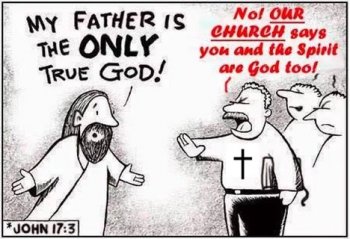At John 10:30 where Jesus said, the Father and are one. Jesus wasn't saying that he and God were the same person, if that's the point you're trying to make with this scripture.
At
John 17:21, 22, he prayed to God that his disciples “may all be one, just as you, Father, are in union with me and I am in union with you, that they also may be in union with us, . . . that they may be one just as we are one.” Was Jesus praying that all his disciples would become a single entity? No, obviously Jesus was praying that they would be united in thought and purpose, as he and God were.(
1 Corinthians 1:10). This is what Jesus meant when he said, the Father and I are one.
At
1 Corinthians 3:6, 8, Paul says: “I planted, Apollos watered . . . He that plants and he that waters are one.” Paul did not mean that he and Apollos were two persons in one; he meant that they were unified in purpose. The Greek word that Paul used here for “one” (
hen) is neuter, literally “one (thing),” indicating oneness in cooperation. It is the same word that Jesus used at
John 10:30 to describe his relationship with his Father. It is also the same word that Jesus used at
John 17:21, 22. So when he used the word “one” (
hen) in these cases, he was talking about unity of thought and purpose.
Regarding
John 10:30, John Calvin (who was a Trinitarian) said in the book
Commentary on the Gospel According to John: “The ancients made a wrong use of this passage to prove that Christ is . . . of the same essence with the Father. For Christ does not argue about the unity of substance, but about the agreement which he has with the Father.”
Right in the context of the verses after
John 10:30, Jesus forcefully argued that his words were not a claim to be God. He asked the Jews who wrongly drew that conclusion and wanted to stone him: “Why do you charge me with blasphemy because I, consecrated and sent into the world by the Father, said, ‘I am God’s son’?” (
John 10:31-36) No, Jesus didn't claim he was God, but said he was the Son of God. So anyone trying to claim that Jesus is saying he and God are the same person at John 10:30 are not listening to Jesus who said he wasn't God nor was he trying to say he was God he spoke the truth that he is the son of God.
At John 1:18 this scripture isn't saying Jesus is God either. The most reliable manuscripts say Jesus who is the only begotten Son of God, is the only gotten god, at John 1:18. Jesus having a close relationship with his Father, who is God, doesn't mean Jesus is God it means that Jesus has a very close relationship with his Father not that the scriptures are claiming he is the Father.


